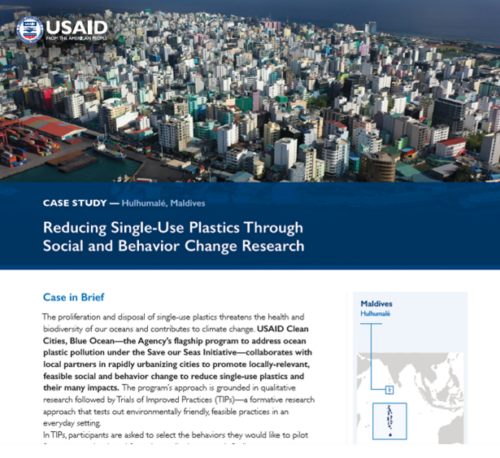Reducing Single-Use Plastics Through Social and Behavior Change Research


The proliferation and disposal of single-use plastics threatens the health and biodiversity of our oceans and contributes to climate change. USAID Clean Cities, Blue Ocean—the Agency’s flagship program to address ocean plastic pollution under the Save our Seas Initiative—collaborates with local partners in rapidly urbanizing cities to promote locally-relevant, feasible social and behavior change to reduce single-use plastics and their many impacts. The program’s approach is grounded in qualitative research followed by Trials of Improved Practices (TIPs)—a formative research approach that tests out environmentally friendly, feasible practices in an everyday setting. In TIPs, participants are asked to select the behaviors they would like to pilot from a menu developed from the qualitative research findings.
In the Maldives’ city of Hulhumalé, with an estimated population of over 240,000—roughly 41 percent of household solid waste is single-use plastics.1 For the Maldives and many other island nations, the lack of space on islands and geographic distance between islands makes it very challenging to store waste and return it to the local or global circular economy, resulting in plastic leakage in the ocean, which becomes a global problem. In response, USAID’s local grantee, the Small Islands Geographic Society (SIGS), designed the Sustainability Begins at HOME (Helping our Marine Environment) project, which employed a modified TIPs approach with Hulhumalé residents that researched and piloted the use of viable alternatives—identifying the greatest areas of opportunity to reduce plastic usage. The research resulted in recommendations for potential local government incentive programs and future social and behavior change strategies, in addition to reducing single-use plastics among the participating households. USAID is engaging other local partners across the Clean Cities, Blue Ocean program to implement TIPs research to help local organizations and governments align solid waste management policies and plans with sustainable behaviors that residents and businesses are able and willing to practice.

